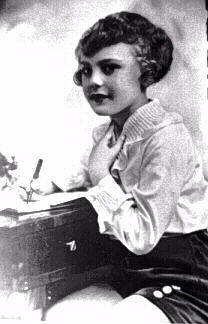Blouses
Blouses are now thought as a woman's shirt, but in fact were
originally
for both women and children, boys and girls. The garments
 extending from the neck to the waist, but without shirttails which
were not suitable for kilts, especially bodice kilts. Boys dressed
in
Fauntleroy suits or
bodice kilts wore these frilly blouses rather
than shirts. A man or big boy's shirt tucks into
the trousers, but a blouse has an elastic threaded through the
waist or a tape, or a band which
buttoned to the pants or kilt. These blouses were often extremely
fancy with elaborate
lace work at the collar and cuffs. Often department stores had
a very wide selection of blouses with various lace trim for a
mother to select for her little darling.
extending from the neck to the waist, but without shirttails which
were not suitable for kilts, especially bodice kilts. Boys dressed
in
Fauntleroy suits or
bodice kilts wore these frilly blouses rather
than shirts. A man or big boy's shirt tucks into
the trousers, but a blouse has an elastic threaded through the
waist or a tape, or a band which
buttoned to the pants or kilt. These blouses were often extremely
fancy with elaborate
lace work at the collar and cuffs. Often department stores had
a very wide selection of blouses with various lace trim for a
mother to select for her little darling.
Less fancy middy blouses were used with
sailor suits. Middy bloses were modeled on the uniform of the British Navy. Authentic
ones had three white stripes at the cuff and neck to honor Nelson's
three great victories. They were first worn by boys, but graduall
middy blouses were also made for girls. This in part expllains the gradual shift
to younger and younger boys wearing them. Now only the youngest of
boys will be seen wearing a middy blouse, but they are still used as girls'
school uniforms in countries like Japan and Korea.
Blouses and shirts have come in a wide range of
collars, both fancy and plain. Fancy blouses for boys, however, have
 long since passed into fashion history. Currently only very small boys wear such blouses for dress occasions and even
this is rare. Fancy blouses are also sometimes worn by small boys at
formal weddings.
long since passed into fashion history. Currently only very small boys wear such blouses for dress occasions and even
this is rare. Fancy blouses are also sometimes worn by small boys at
formal weddings.
Christopher Wagner
histclo@lycosmail.com
Navigate the Boys' Historical Clothing Web Site:
[
Introduction]
[
Chronology]
[
Clothing styles]
[
Biographies]
[
Bibliographies]
[
Contributions]
[
Boys' Clothing Home]
 extending from the neck to the waist, but without shirttails which
were not suitable for kilts, especially bodice kilts. Boys dressed
in
Fauntleroy suits or
bodice kilts wore these frilly blouses rather
than shirts. A man or big boy's shirt tucks into
the trousers, but a blouse has an elastic threaded through the
waist or a tape, or a band which
buttoned to the pants or kilt. These blouses were often extremely
fancy with elaborate
lace work at the collar and cuffs. Often department stores had
a very wide selection of blouses with various lace trim for a
mother to select for her little darling.
extending from the neck to the waist, but without shirttails which
were not suitable for kilts, especially bodice kilts. Boys dressed
in
Fauntleroy suits or
bodice kilts wore these frilly blouses rather
than shirts. A man or big boy's shirt tucks into
the trousers, but a blouse has an elastic threaded through the
waist or a tape, or a band which
buttoned to the pants or kilt. These blouses were often extremely
fancy with elaborate
lace work at the collar and cuffs. Often department stores had
a very wide selection of blouses with various lace trim for a
mother to select for her little darling.
 long since passed into fashion history. Currently only very small boys wear such blouses for dress occasions and even
this is rare. Fancy blouses are also sometimes worn by small boys at
formal weddings.
long since passed into fashion history. Currently only very small boys wear such blouses for dress occasions and even
this is rare. Fancy blouses are also sometimes worn by small boys at
formal weddings.